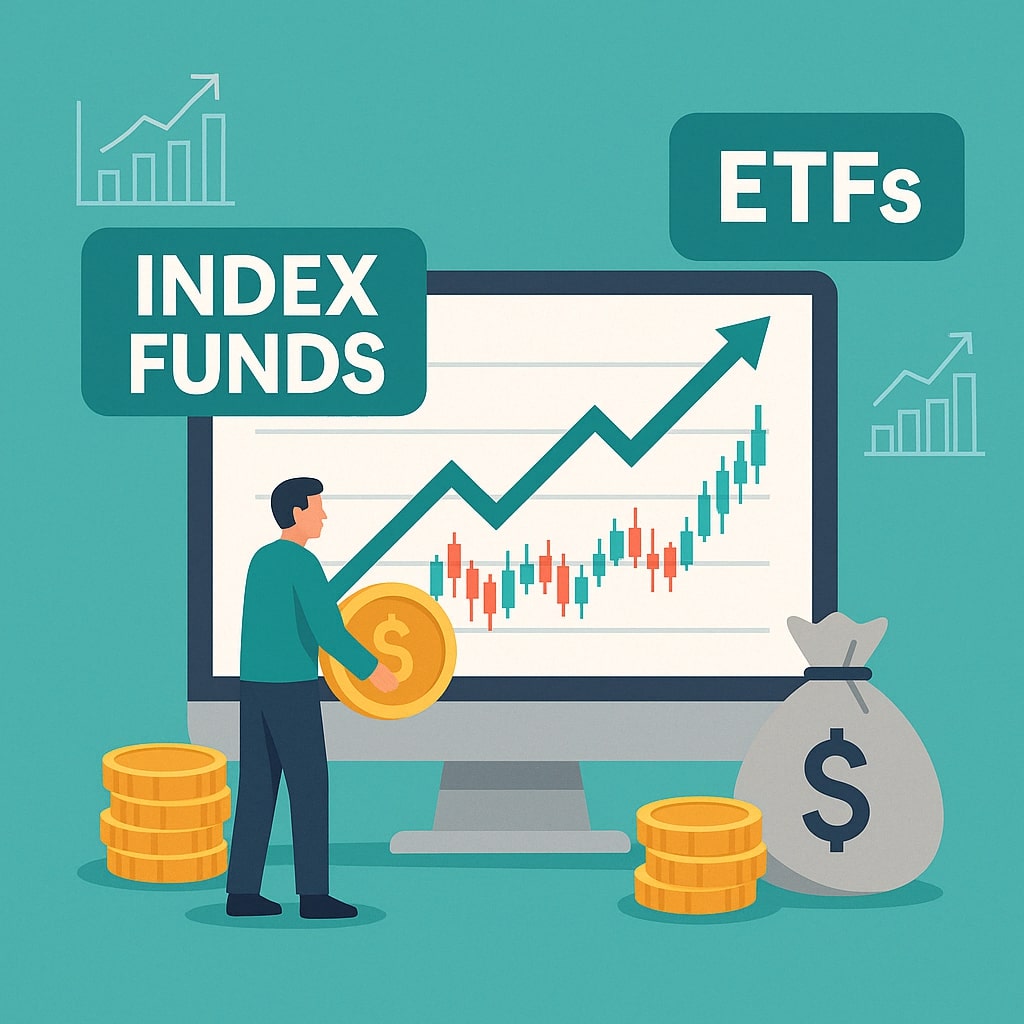Index Funds & ETFs: The Easiest Way for Young Investors to Get Diversified

Index Funds & ETFs: The Easiest Way for Young Investors to Get Diversified
Okay, you know investing is important for building long-term wealth, but the idea of researching and picking individual stocks feels daunting, right? How do you choose winners? What if you pick the wrong company? It's a common concern, but thankfully, there's a much simpler and highly effective approach: Index Funds and Exchange-Traded Funds (ETFs).
These popular investment vehicles are fantastic tools, especially for beginners, because they solve two big challenges: diversification and cost.
First, What's Diversification and Why Bother?
You've heard "don't put all your eggs in one basket." That's diversification in a nutshell. In investing, it means spreading your money across many different investments rather than betting everything on just one or two companies. If one investment performs poorly, diversification helps cushion the blow because your other investments might be doing well. It's a fundamental strategy for reducing risk.
Enter Index Funds: Investing on Autopilot
An Index Fund is a type of mutual fund (or ETF) designed to automatically track the performance of a specific market index. Think of an index like the S&P 500 – it represents the performance of 500 of the largest U.S. companies.
- How it Works: Instead of a fund manager actively trying to pick winning stocks to beat the market, an index fund simply aims to match the market's return by holding all (or a representative sample) of the stocks or bonds within that specific index. This is called passive investing.
- Benefit 1: Instant Diversification: When you buy shares in an S&P 500 index fund, you instantly own a tiny slice of all 500 companies in that index. One purchase, massive diversification!
- Benefit 2: Super Low Costs: Because there's no expensive research team or active trading, index funds typically have very low expense ratios (annual fees). Lower fees mean more of your money stays invested and working for you, which makes a huge difference over decades.
Meet ETFs: Index Funds' Flexible Cousin
An Exchange-Traded Fund (ETF) is similar to a mutual fund because it holds a basket of assets (stocks, bonds, commodities, etc.). Crucially, many popular ETFs are index funds.
- Key Difference: ETFs trade on stock exchanges throughout the day, just like individual stocks. You can buy or sell them anytime the market is open at the current market price. Traditional mutual funds, including many index mutual funds, are typically priced only once per day after the market closes.
- Benefits:
- Diversification: Like index mutual funds, they offer easy diversification.
- Low Costs: Index ETFs, in particular, usually have very low expense ratios.
- Trading Flexibility: Buy and sell during market hours.
- Low Minimums: You can often buy just one share, making them very accessible.
- Transparency: ETF holdings are often disclosed daily.
Index Mutual Fund or Index ETF?
For beginners aiming for low-cost diversification, either is a great choice! Index ETFs offer intraday trading and might have slightly lower costs or better tax efficiency in taxable accounts, but index mutual funds can be simpler for setting up automatic, regular investments. The core benefit – easy, cheap diversification – applies to both.
Why Are They Great for Young Investors?
- Simplicity: Takes the guesswork out of picking individual stocks.
- Instant Diversification: Reduces risk from the get-go.
- Low Cost: Keeps more of your returns in your pocket.
- Proven Strategy: Historically, passively tracking the market has been a very successful long-term investment strategy, often outperforming the majority of actively managed funds (especially after accounting for fees).
How to Get Started
You can easily buy index funds and ETFs through a brokerage account. This can be a standard taxable brokerage account or, very commonly, within a retirement account like a Roth IRA, Traditional IRA, or your workplace 401(k)/403(b) (which usually offer a selection of index mutual funds).
The Bottom Line
Index funds and ETFs make smart, diversified, low-cost investing accessible to everyone. They remove the need to be a stock-picking genius and allow you to participate in the broad growth of the market over time. If you're looking for a simple yet powerful way to start building long-term wealth, make index funds and ETFs a core part of your investment plan.
Disclaimer:
The information provided in this article is for informational and educational purposes only and does not constitute financial, investment, legal, or tax advice. The content is based on sources believed to be reliable, but the author and publisher make no representations or warranties as to its accuracy, completeness, or timeliness.
The author is not a licensed financial advisor, registered investment adviser, or broker-dealer. You should consult with qualified professionals (such as a Certified Financial Planner®, accountant, or attorney) who can assess your individual situation before making any financial decisions or taking any action based on the information presented here.
Investing involves risk, including the possible loss of principal. Past performance is not indicative of future results. Any examples or discussions of specific investments, strategies, or products are for illustrative purposes only and are not endorsements or recommendations.
Financial markets and regulations change frequently, and the information in this article may become outdated. We are not obligated to update any information herein. Your financial situation is unique, and any decisions you make should be based on your own research, due diligence, and consultation with professional advisors, considering your personal objectives, risk tolerance, and financial circumstances. Reliance on any information provided in this article is solely at your own risk.
Stay Ahead with Our Newsletter
Get exclusive financial insights, market analysis, and expert tips delivered directly to your inbox.